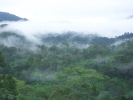 The Forestry Commission of Zimbabwe's says 20 percent of the 330,000 hectares of natural forest lost annually (the Commission's 2005 figures) was cut for firewood to cure tobacco. The deforestation rate was particularly high during the height of the land reform programme, which began in 2000. Under the programme the government intended to acquire 11 million hectares of white-owned farmland and redistribute it on a massive scale.
The Forestry Commission of Zimbabwe's says 20 percent of the 330,000 hectares of natural forest lost annually (the Commission's 2005 figures) was cut for firewood to cure tobacco. The deforestation rate was particularly high during the height of the land reform programme, which began in 2000. Under the programme the government intended to acquire 11 million hectares of white-owned farmland and redistribute it on a massive scale.
Income from tobacco in 2013, accounted for at least 10.7 percent of Zimbabwe’s GDP and 21.8 percent of all exports, compared to 9.2 percent for other agricultural commodities. But the majority of the new farmers use wood to cure their tobacco, said Abedinigo Marufu, the deputy general manager of the Forestry Commission.
Prior to the land reform, most of the about 1,500 white large-scale tobacco growers used forced air curing units which use power to drive motors and fans to push the hot air fired by coal, through the curing system. The remainder used wood.
The most authoritative figures on forest cover loss come from the UN Food and Agriculture Organization (FAO) Global Forest Resources Assessment.
Its 2010 edition, it listed Zimbabwe as being among 10 countries that recorded the largest forest cover loss between 1990 and 2010. It said Zimbabwe had been losing 327,000 hectares of forest cover per year over the two decades.
Besides being used as firewood for curing tobacco and in other sectors such as brick-making, the other drivers of deforestation in Zimbabwe include agricultural expansion driven by population growth and forest fires.
The decimation of forests has reached such alarming proportions that during his Independence Day address earlier this year, President Robert Mugabe threatened to ban the growing of tobacco.
“Our people are growing tobacco and want to make money out of it but on the down side we have seen massive deforestation leading to desertification in some areas. We are saying to them, ‘use coal or we will stop tobacco production’,” he said.


